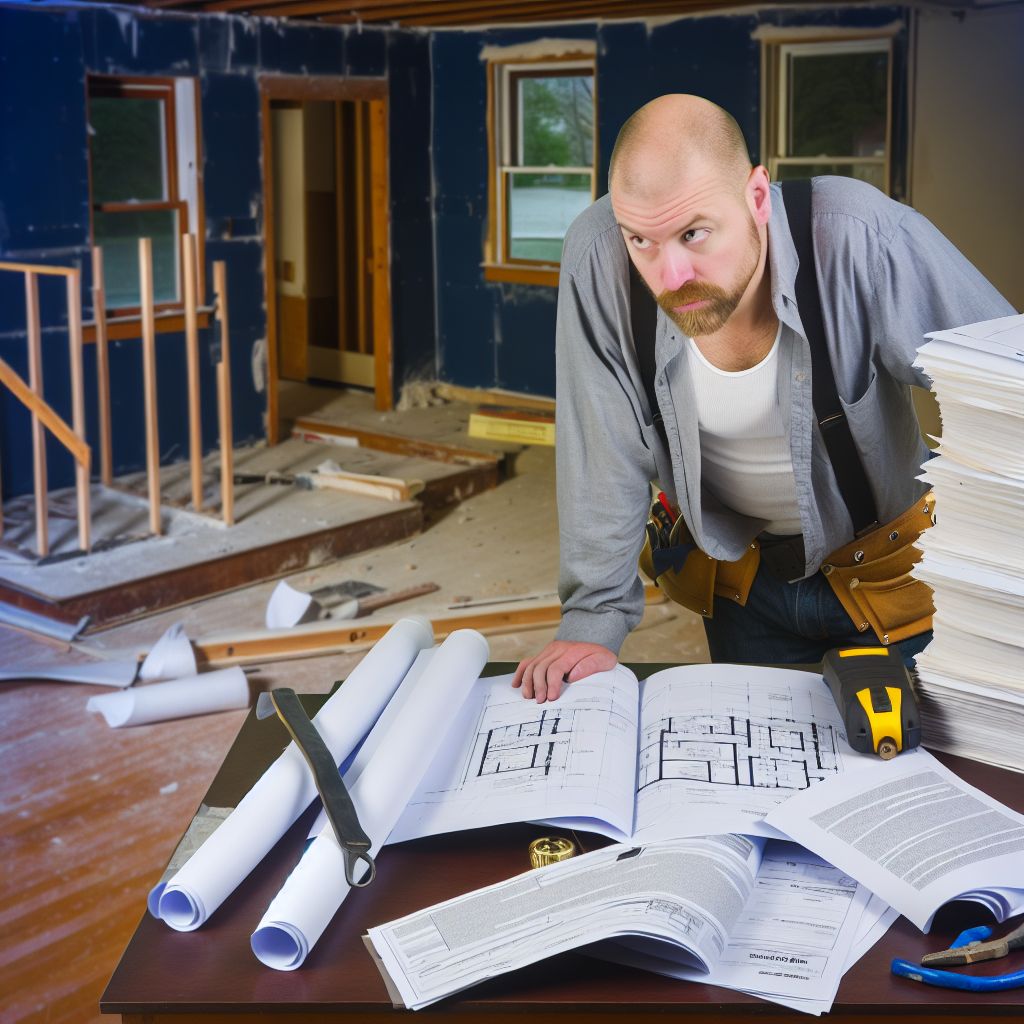Understanding Local Building Codes and Their Importance
Defining Building Codes
Building codes are regulations that govern construction standards.
They ensure safety and structural integrity in buildings.
Each locality creates and enforces its own set of codes.
These codes often cover various aspects, including electrical and plumbing work.
The Role of Building Codes
Building codes protect public health and safety.
They help to prevent accidents and ensure accessibility.
Compliance with codes also minimizes potential legal issues.
Researching Local Regulations
Start by contacting your local building authority.
Many municipalities have dedicated websites for easy access.
Consider visiting local libraries for physical copies of codes.
Join community forums or social media groups for insights.
Obtaining Necessary Permits
Acquiring building permits is crucial before starting renovations.
Permits vary based on the type and scale of your project.
Common permits include those for electrical, structural, and plumbing work.
Failing to secure a permit can lead to fines and project delays.
Staying Updated on Changes
Building codes can change, so stay informed on updates.
Regularly check your local authorities for new regulations.
Attend workshops to understand the implications of these changes.
Considering legal advice can also be beneficial.
The Importance of Professional Guidance
Working with licensed professionals can simplify the process.
Contractors usually have in-depth knowledge of local codes.
They can help ensure compliance and expedite permit applications.
Overall, professional assistance mitigates risks associated with renovations.
Researching Required Permits for Specific Renovation Projects
Understanding the Importance of Permits
Permits are crucial for home renovation projects.
They ensure compliance with local building codes.
Additionally, permits protect your investment in the property.
Types of Renovation Projects Requiring Permits
Many renovation projects require permits.
These include major structural changes.
In addition, electrical and plumbing work often needs approval.
Landscaping modifications may also require permits.
Where to Find Permit Information
Begin with your local building department.
The department’s website usually lists required permits.
Moreover, you can contact them directly for specifics.
Check your state’s licensing board for additional guidance.
Steps to Apply for a Permit
- Gather all necessary documentation for your project.
- Complete the permit application form accurately.
- Submit your application along with required fees.
- Prepare for potential inspections during the process.
Common Mistakes to Avoid
Do not ignore local regulations related to permits.
Ensure your project aligns with zoning laws.
Additionally, avoid starting work before obtaining permits.
Skipping this step can lead to costly fines.
Consulting with Professionals
Consider consulting a licensed contractor for guidance.
They often understand permit processes better.
Furthermore, architects can provide insights for complex renovations.
Leverage their expertise to ensure compliance.
The Role of Homeowner Associations in Renovation Regulations
Understanding Homeowner Associations
Homeowner associations, or HOAs, play a significant role in residential communities.
They create rules to maintain property values and community standards.
Consequently, these regulations affect homeowner renovations.
Importance of HOA Guidelines
HOA guidelines often include restrictions on exterior changes.
For instance, these rules may cover paint colors and landscaping designs.
As a result, it’s crucial to review these guidelines before starting a project.
Approval Process for Renovations
Generally, homeowners must seek approval for certain renovations.
This process often involves submitting detailed plans to the HOA.
Furthermore, timely communication helps prevent delays and misunderstandings.
Common Renovation Restrictions
Many HOAs enforce restrictions on noisy activities during specific hours.
Additionally, they may limit the size and style of fences and decks.
Homeowners should familiarize themselves with these common limitations.
Consequences of Non-Compliance
Failing to adhere to HOA regulations can lead to penalties.
In some cases, the HOA may impose fines on non-compliant homeowners.
Ultimately, these consequences can negatively impact property values.
Collaborating with the HOA
Building a positive relationship with the HOA is beneficial for homeowners.
Attending HOA meetings helps homeowners stay informed about changes.
Moreover, fostering communication can lead to smoother renovation experiences.
You Might Also Like: DIY Renovation Tips For Flipping Houses Like A Pro
Navigating the Permit Application Process
Understanding Your Project
Begin by determining the scope of your renovation project.
Identify whether your renovations involve structural changes or simple cosmetic updates.
Consult local building codes to ascertain what’s permitted.
When in doubt, reach out to your city or town’s planning office.
Research Required Permits
Different renovations require different permits.
Common permits include building, electrical, plumbing, and zoning permits.
Check state and local regulations for specific requirements.
Create a checklist of potential permits needed for your project.
Prepare Necessary Documentation
Gather all required documents before starting the application process.
This may include architectural plans, property surveys, and contractor information.
Ensure all documents are up-to-date and properly formatted.
Incorporate any other supporting materials as instructed by local authorities.
Submit Your Application
Complete the permit application form accurately and legibly.
Review your application for any missed information.
Submit the application and associated documents to the relevant authority.
Retain copies of everything for your records.
Pay Any Fees
Be prepared to pay associated fees upon submission.
Fees vary significantly depending on the type of permit.
Understand the fee structure to avoid surprises later on.
Await Approval
After submission, anticipate a response from your local authority.
The approval timeline can vary based on the project size and local demand.
If denied, review the reasons and make necessary adjustments.
Schedule Inspections
Some permits require inspections at various project stages.
Be proactive in scheduling these inspections promptly.
Ensure your project adheres to all relevant codes and regulations.
Keep Detailed Records
Maintain a complete record of all permits and inspections.
This documentation can be crucial for future projects or property sales.
Consider creating digital backups for easy access.
Find Out More: Renovation Cost Estimation for Fixer-Upper Homes
Common Mistakes to Avoid When Applying for Renovation Permits
Neglecting Research on Local Regulations
Many homeowners fail to research local renovation regulations thoroughly.
This oversight can lead to unexpected fines and delays.
Always check with your local municipality before starting any project.
Understanding the rules in advance can save you time and money.
Submitting Incomplete Applications
Incomplete applications are a common reason for permit denials.
Homeowners often overlook required documents or details.
Double-check your application for completeness before submission.
This includes plans, specifications, and any necessary fees.
Ignoring the Importance of Accurate Plans
Accurate and detailed plans are crucial for permit approval.
Vague or poorly drawn plans can lead to misunderstandings with inspectors.
Consider hiring a professional drafter or architect if needed.
They can help ensure your plans meet all requirements.
Failing to Consult Professionals When Needed
Some homeowners attempt renovations without professional guidance.
This can result in mistakes that are costly to fix later.
Consulting contractors or engineers can provide valuable insights.
Professional advice helps ensure compliance with safety standards.
Overlooking Timeline and Deadlines
Homeowners often disregard the timeline for permit approval.
Applications can take weeks or even months to process.
Submit your application as early as possible to avoid delays.
Planning ahead can help you stick to your renovation schedule.
Disregarding Communication with the Local Office
Effective communication with the local permitting office is essential.
Many people avoid contacting officials until issues arise.
Stay proactive and reach out with questions during the process.
This can help clarify requirements and mitigate problems.
Neglecting to Prepare for Inspections
Inspections are a critical part of the renovation permit process.
Homeowners sometimes fail to prepare adequately for these visits.
Make sure your project is aligned with your approved plans.
This will facilitate a smooth inspection process.
Forgetting About Necessary Fees
Many forget to budget for permit fees during renovations.
Permits can incur various charges that can accumulate quickly.
Research all costs beforehand to prepare your budget properly.
This step helps avoid financial surprises later in your project.
Uncover the Details: How to Incorporate Smart Technology During Home Renovations

How to Appeal a Permit Denial: Tips and Strategies
Understanding Permit Denials
A permit denial can happen for various reasons.
Understanding these reasons is essential for a successful appeal.
Common issues include incomplete applications or zoning violations.
Additionally, local regulations may impose restrictions on your project.
Gathering Necessary Documentation
Start by reviewing the denial letter carefully.
Identify the specific reasons the permit was denied.
Gather all relevant documents to support your case.
These documents can include site plans, photographs, and correspondence.
Make sure your documentation is organized and easy to follow.
Consulting with Experts
Consider seeking professional advice from experts.
An architect or city planner can provide valuable insights.
They can help you navigate the appeal process effectively.
Moreover, a lawyer experienced in zoning law can assist you.
Preparing Your Appeal
Draft a clear and concise appeal letter.
Address the letter to the appropriate authority.
Clearly state your reasons for appealing the denial.
Provide evidence that supports your case.
Make sure to reference any relevant regulations or ordinances.
Submitting Your Appeal
Submit your appeal within the specified timeframe.
Keep copies of all submitted documents for your records.
Ensure that you follow up to confirm receipt of your appeal.
Find out if you need to attend any hearings related to the appeal.
Preparing for the Appeal Hearing
If a hearing is scheduled, preparation is crucial.
Practice presenting your case clearly and confidently.
Be ready to answer questions from officials or neighbors.
Using visuals, such as site plans or photographs, can strengthen your presentation.
Staying Persistent
Sometimes, appeals do not go as planned.
Remain persistent and consider resubmitting with additional information.
Research alternative solutions that may meet local requirements.
Building positive relationships with local officials can be beneficial.
Ultimately, staying informed and engaged is key to your success.
Learn More: Optimizing Budget Planning Through Renovation Cost Estimation For U.S. Investors
Understanding Inspections and Their Role in Renovation Projects
Importance of Inspections
Inspections play a crucial role in home renovations.
They ensure your project complies with local building codes.
This compliance helps maintain safety standards.
Regular inspections can prevent costly future issues.
Furthermore, they enhance the overall quality of your work.
Types of Inspections
Different types of inspections exist for various renovation stages.
- Pre-construction inspections assess the site before work begins.
- During construction, progress inspections monitor ongoing work.
- Final inspections ensure everything meets required standards.
Preparing for Inspections
Preparation is key for successful inspections.
Start by ensuring all necessary documents are ready.
This includes permits, plans, and contracts.
Additionally, keep the work area clean and accessible.
Clear communication with inspectors can also smooth the process.
Dealing with Inspection Results
After an inspection, you will receive a report.
This report outlines any issues found during the inspection.
Take the time to review the findings carefully.
Address any problems promptly to avoid delays.
If necessary, request a follow-up inspection after corrections.
Keeping Up with Changes in Local Regulations
Understanding Local Laws
Local regulations vary greatly by area.
Always research your specific location.
Visit your city or county planning office for details.
Online resources often provide current laws.
Utilizing Online Resources
Websites offer valuable information on local permits.
Check government or municipality websites regularly.
Many jurisdictions have dedicated renovation sections online.
Consider signing up for email updates from your local authority.
Networking with Local Contractors
Experienced contractors understand local regulations well.
Build relationships with trusted local builders.
They can guide you through the permitting process.
Ask for references and project portfolios as well.
Joining Community Forums
Online forums allow homeowners to share experiences.
Consider joining local social media groups focused on renovations.
These platforms often provide up-to-date information.
Community members can give tips on navigating regulations.
Consulting Professionals
Hire professionals when necessary for complex projects.
Architects and engineers are knowledgeable about permits.
They can help ensure compliance with all regulations.
Investing in professionals can save time and money.
Staying Informed on Changes
Regulations can change frequently, so stay informed.
Attend local planning meetings to stay updated.
Check for announcements about law changes regularly.
Keeping informed can help prevent costly mistakes.
Additional Resources
Building Permits and Inspection
Plan Review, Permits, and Inspections – City and County of Denver




